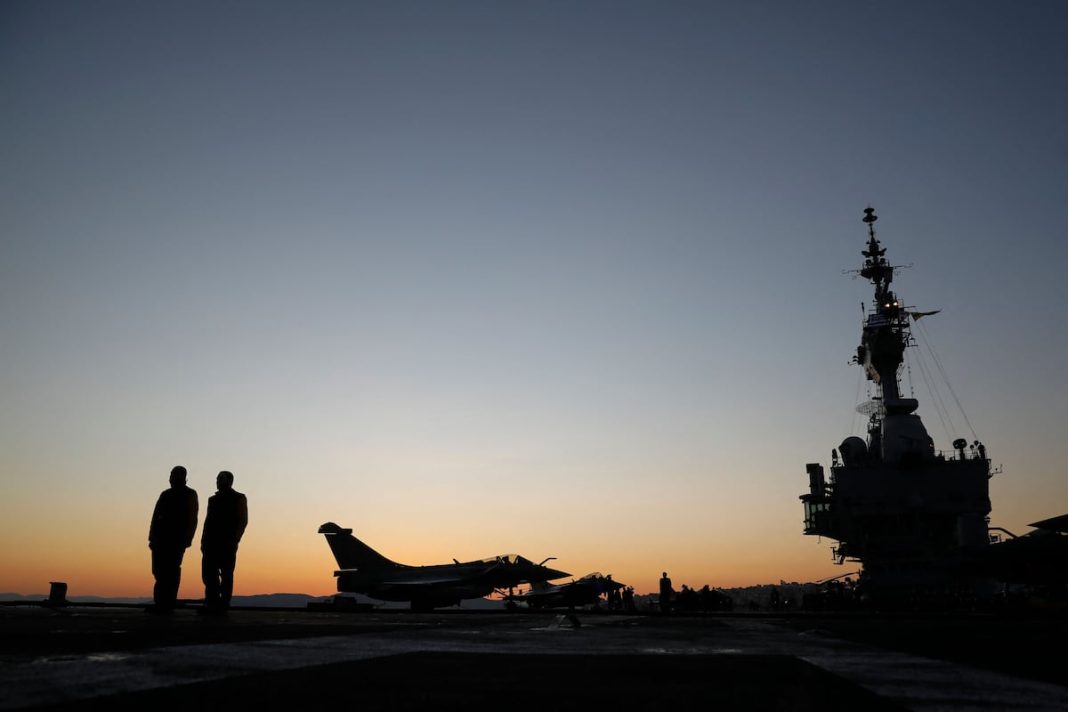Rear Adm. Jacques Mallard has been at the helm of the French carrier strike group, known as FRSTRIKEFOR, since August 2023. He has emphasized the importance of refining data sharing, improving decision-making processes, and training under realistic combat conditions. The group, which includes France’s nuclear-powered aircraft carrier Charles de Gaulle, is preparing for an upcoming deployment to the Indo-Pacific region as part of mission Clemenceau 25. This mission will feature participation in three major exercises alongside allied nations.
In an interview during the Euronaval Talks in Paris, Mallard addressed the evolving nature of naval warfare, particularly with the new types of threats and environments that his group is now facing. A primary focus of the FRSTRIKEFOR is enhancing its capability to handle data, especially given the overwhelming volume of information military forces are required to process today. To address this, the French Navy has implemented data hubs, which have been successfully tested on the frigate Fremm Provence. These hubs will be part of the deployment to the Indo-Pacific.
Mallard elaborated on the challenges faced by the French Navy regarding data utilization, noting a skill gap in effectively interpreting and applying this information. As a solution, data scientists will join the mission on military reservist contracts to provide expertise in data analysis. This initiative aims to develop new applications that can benefit the entire French Navy and set future benchmarks for operational capabilities.
FRSTRIKEFOR recently participated in the Mare Aperto 2024 exercise with the Italian Navy, which Mallard described as transformative. The exercise echoed real-world conditions where both sides engage in tactical confrontations, a stark departure from previous training exercises. The competitive nature of Mare Aperto introduced a level of realism that prepares the crews for potential real-world conflicts, reinforcing the necessity of cooperation and sharp tactical responses amidst unpredictability at sea.
The interview also touched upon the delicate balance of information sharing among allied forces compared to maintaining operational confidentiality. Mallard spoke about the shift from segregated communications to a new data-centric security approach that fosters collaboration while ensuring that sensitive information is selectively shared according to need.
Preparatory discussions regarding the upcoming deployment to the Indo-Pacific highlighted the significance of establishing a strategic presence in an area projected to witness substantial global economic activity. This effort aligns with France’s expanded commitment to regional stability and interoperability with local and allied navies.
While previous naval engagements provided some experience in the Indo-Pacific, Mallard acknowledged the need for ongoing adaptation to the dynamic security environment marked by advanced competitors. He stressed that a successful deployment would not only broaden operational reach but also strengthen partnerships through shared data and cohesive operational strategies.
Mallard recognized the slow pace of adapting complex weapon systems, likening the evolution of military technology to smartphone upgrades, emphasizing that it often requires months or years rather than days. He underscored the significance of personnel competency, stating that training skilled operators is crucial to leveraging advanced systems effectively.
Looking to the future, emerging technologies such as artificial intelligence are anticipated to enhance situational awareness and improve data management. However, Mallard cautioned that the essence of naval combat—strategically deploying firepower and safeguarding assets—remains unchanged regardless of technological advancements.
In reflecting on international cooperation, Mallard noted a shift over the past decades from combating asymmetric threats to facing more sophisticated, symmetrical challenges. This evolution necessitates a mindset that prioritizes humility and efficiency in military operations.
Addressing the central challenges of modern naval engagement, Mallard pointed out that maritime spaces are increasingly contested, with varying actors claiming authority over international waters. Such dynamics require a concerted effort among nations to uphold long-standing principles governing freedom of navigation.
For the upcoming year, Mallard’s ambitions for FRSTRIKEFOR center around effective logistics management in operations far from home bases, alongside a renewed emphasis on innovative data strategies to optimize combat systems. The challenges presented by this ambitious mission will shape future developments in naval warfare and international collaboration.





